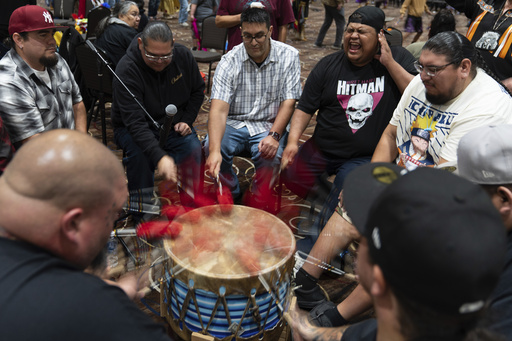
LINCOLN CITY, Ore. — The rhythmic sounds of drumming reverberated through the conference room of the Chinook Winds Casino Resort in Lincoln City, Oregon, where a celebration erupted as hundreds of individuals dressed in tribal attire danced in a circle.
This event marks 47 years since the Confederated Tribes of Siletz Indians initiated their annual powwow to commemorate the restoration of their federal recognition. However, this year’s gathering held deeper meaning, occurring just weeks after a federal court lifted long-standing limitations on the tribe’s hunting, fishing, and gathering rights—restrictions that had faced opposition from tribal leaders for years.
“We’re back to the way we were before,” expressed Siletz Chairman Delores Pigsley. “It feels really good.”
The Siletz tribe comprises over two dozen bands and tribes that historically occupied areas of western Oregon, as well as parts of northern California and southwestern Washington. During the 1850s, they were forcibly relocated to a reservation on the Oregon coast, where they were consolidated into a single federally recognized entity, despite their distinct heritages and languages.
During the mid-20th century, specifically in the 1950s and ’60s, Congress withdrew recognition from over a hundred tribes, including the Siletz, due to a policy termed “termination.” This led to the loss of millions of acres of tribal land along with the loss of federal support and services.
“The aim was to assimilate Native peoples into urban living,” said Matthew Campbell, deputy director of the Native American Rights Fund. “There were also financial motives, as the U.S. sought to cut costs associated with tribal nations.”
The loss of land and autonomy was profoundly traumatic, prompting the tribes to fight for federal acknowledgment once more. In 1977, the Siletz became the second tribe to successfully regain recognition, following the re-establishment of the Menominee Tribe in Wisconsin four years earlier.
To reclaim a mere fraction of its original territory—approximately 3,600 acres out of the 1.1 million-acre reservation established in 1855—the Siletz had to consent to a federal court mandate that imposed restrictions on their hunting, fishing, and gathering rights. This agreement rendered them one of just two tribes in the nation, along with the Confederated Tribes of Grand Ronde, forced to accept such conditions to recover tribal land.
The settlement imposed stringent guidelines on where tribal members could fish and hunt for ceremonial and subsistence needs, with limits on the quantity of salmon, elk, and deer they could harvest annually. The effects were devastating, as Pigsley recalled; the tribe had to purchase salmon for ceremonies because they could not adequately sustain themselves, and tribal members faced arrests for alleged hunting and fishing infractions.
“Giving up those rights was incredibly painful,” Pigsley, who has been leading the tribe for 36 years, acknowledged earlier this year. “It felt unjust at the time, and we’ve endured it for all these years.”
Decades later, both Oregon and the federal government recognized the discriminatory nature of the 1980 Agreement and Consent Decree placing the tribe under state hunting and fishing regulations. They agreed to petition the court to eliminate these restrictions.
“The Governor of Oregon and the state’s congressional representatives have acknowledged that the previous agreements reflected the biases of their era and undermined the tribe’s sovereignty, tradition, and capability to manage wildlife essential for its cultural and subsistence needs,” attorneys representing the U.S. government, the state, and the tribe stated in a joint court statement.
Late last month, the Siletz tribe successfully had the federal court order annulled. A subsequent agreement with the Oregon Department of Fish and Wildlife has enhanced the tribe’s authority over their hunting and fishing practices.
Reflecting on the generations of ancestors who did not live to see the restoration of their rights, Pigsley expressed optimism for the future, focusing on youth learning their cultural traditions. “There are many young individuals who are embracing and practicing tribal traditions,” she noted. “Reconnecting with natural foods is vital for fostering healthy families.”
Among the participants at the powwow was Tiffany Stuart, adorned with a traditional basket cap, crafted by her ancestors, alongside her three-year-old daughter, Kwestaani Chuski, meaning “six butterflies” in the regional Athabaskan language. Stuart articulated the significance of the restored rights, describing it as “very moving for my kids to dance.”
“You dance for those who can no longer dance,” she shared poignantly.
